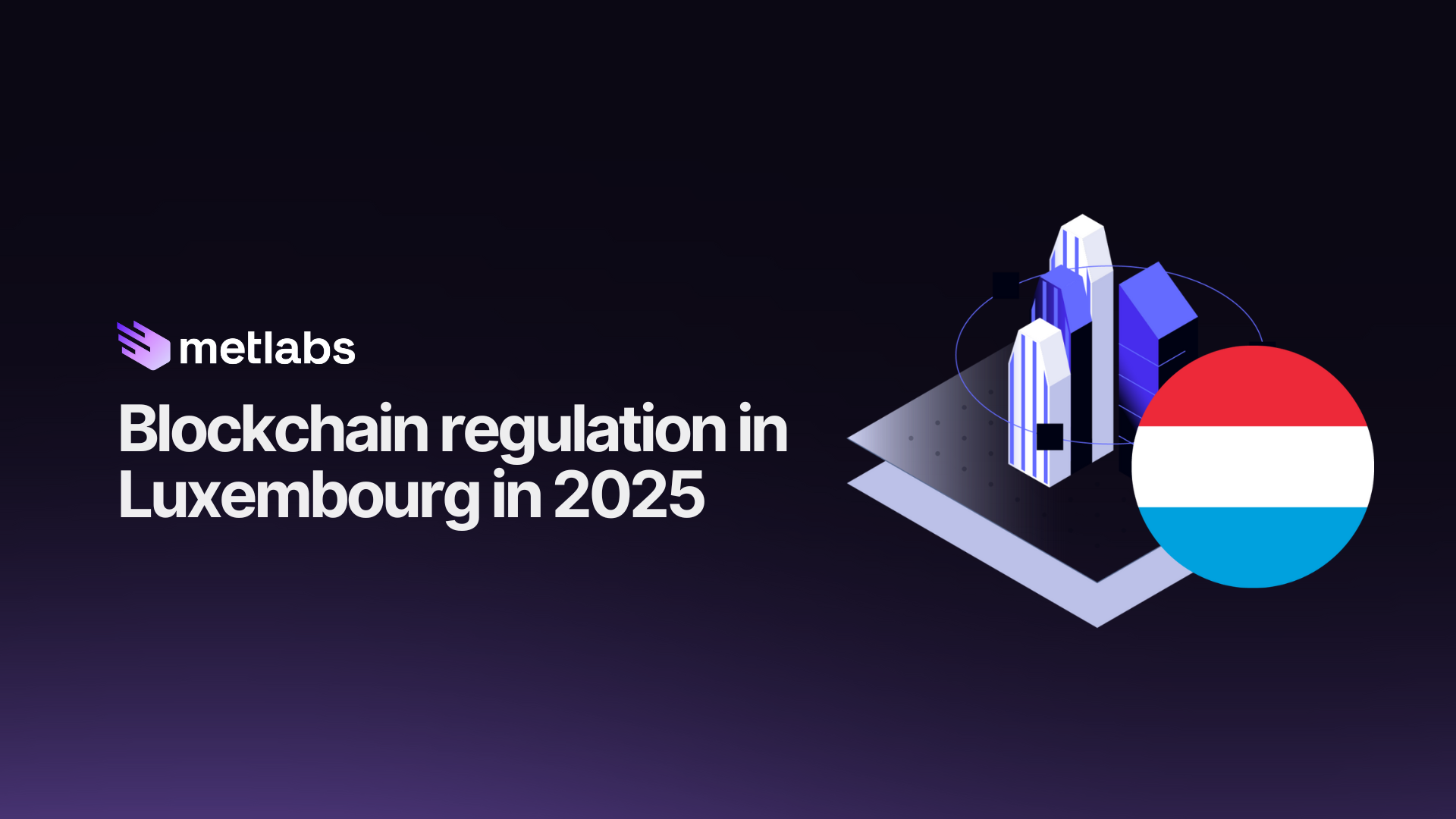The adoption of blockchain technology and asset tokenization is advancing at a rapid pace, but the real engine driving its global development is the existence of a clear, consistent and innovation-friendly legal framework.
Some countries have already established themselves as regulatory benchmarks, establishing specific rules for cryptoassets, DLT infrastructures and token issuance with legal backing. In this article we show you the relevant information about blockchain regulation in Luxembourg, which you can use as a guide if you are looking to operate internationally or evaluate different strategic locations.

Current legislation on blockchain and virtual assets in Luxembourg.
MiCA Regulation (Markets in Crypto-Assets Regulation)
Establishes the EU’s first comprehensive legal framework for regulating cryptoasset issuers and service providers (CASPs). Covers stablecoins, utility tokens, electronic money tokens (EMTs), asset referenced tokens (ARTs), and custody or exchange platforms. Requires prior authorization, governance requirements, solvency, transparency, and user protection.
MiFID II (Markets in Financial Instruments Directive II)
The European MiFID II directive regulates the provision of investment services and trading on securities markets. It applies to security tokens and other cryptoassets that qualify as financial instruments. It establishes requirements on transparency, investor protection, advisory services, management of conflicts of interest, order execution and prudential requirements for investment firms operating in these markets.
Financial Assets Law DLT
The DLT Financial Assets Law in Luxembourg amends the existing legal framework to legally recognize DLT registries as official property registries. It allows for the tokenization of securities, stocks, bonds and fund shares, ensuring their full legal equivalence with traditional registries. The law provides legal certainty for the issuance, transfer and ownership of tokenized financial assets.
Cryptoassets Sandbox and DLT Pilot Regime in Luxembourg
The regulatory sandbox on cryptoassets and the DLT Pilot Regime in Luxembourg allow companies to innovate in a controlled environment. They facilitate experimentation with blockchain business models in areas such as asset tokenization, decentralized finance (DeFi) and stablecoins. This regulated framework promotes innovation by allowing participants to operate temporarily under adapted conditions before fully integrating into the European regulatory regime.
Tokenization makes it possible to digitally represent real-world assets via blockchain, but for it to have legal value, a regulatory framework recognizing this operation is essential. Luxembourg adopts its own approach, establishing specific rules for the issuance, custody or trading of tokens. In this block we explain how asset tokenization is regulated from a legal point of view, taking an advanced jurisdiction such as Luxembourg as an example.
Regulation of asset tokenization in Luxembourg
Luxembourg recognizes the legal validity of asset tokenization in both its private and financial law. The DLT Law and recent reforms ensure that blockchain registries are considered official property registries, allowing assets such as shares, bonds, real estate, funds and other real assets (RWA) to be tokenized with legal certainty.
Since the entry into force of the MiCA Regulation, the legal framework for issuers and service providers of cryptoassets in the EU has been strengthened. In Luxembourg, security tokens require approval from the CSSF and are subject to the same requirements as traditional securities under MiFID II and MiCA. Tokenization of non-financial assets is permitted subject to compliance with any applicable civil or tax requirements.
Luxembourg is actively driving the development of DLT-based market infrastructures and the growth of secondary markets for tokenized assets. The country has established itself as a leading European tokenization hub, offering a robust and attractive legal environment for institutional and retail investors.
Digital asset regulatory bodies and authorities in Luxembourg
Sector Surveillance Committee (CSSF)
It is the leading authority in blockchain and cryptoasset regulation in Luxembourg. It oversees CASPs, token issuance and market activities. It is responsible for licensing under the MiCA Regulation, ensuring compliance with AML/CFT regulations, and protecting investors. It also publishes updated technical guidelines.
Central Bank of Luxembourg (BCL)
The BCL participates in European projects for the study and development of a European CBDC. Although it does not directly regulate cryptoassets, it assesses their impact on financial stability and collaborates in the supervision of stablecoins with potential systemic effect, especially with regard to asset reservation, liquidity risks and governance.
Financial Intelligence Unit (CRF)
The CRF is Luxembourg’s financial intelligence unit. It is responsible for the prevention of money laundering and terrorist financing, as well as for receiving, analyzing and transmitting suspicious transaction reports. It works closely with the CSSF and other agencies to strengthen the integrity of the financial system.
Launching a business based on digital assets requires more than just technology: it is also necessary to comply with legal requirements such as licensing, registration and regulatory obligations. These conditions ensure that the business model is viable and sustainable over time, and that it meets transparency and fraud prevention standards. In this section we explore what licenses are typically required and what compliance criteria blockchain companies operating in Luxembourg must follow.

What licenses and requirements are needed to trade cryptoassets in Luxembourg?
CASP License (MiCA)
Under the MiCA Regulation, CASP licensing is mandatory for exchanges, custodians, issuers of stablecoins (EMTs or ARTs) and other cryptoasset service providers operating in Luxembourg or the EU. The CSSF is the competent authority that grants or denies prior authorization to CASPs. In the case of issuers of stablecoins with potential systemic impact, the CSSF acts in coordination with the Central Bank of Luxembourg (BCL) and other European authorities, in accordance with the supervisory framework set out in MiCA.
Investment Firm License (ESI)
If a platform in Luxembourg offers financial derivative products whose underlying are cryptoassets (e.g. futures, options, CFDs), these are considered financial instruments under European (MiFID II) and Luxembourg law. In these cases, the operator needs an Investment Firm license granted by the CSSF to be able to offer these products legally.
AML/KYC Compliance
All companies operating with cryptoassets in Luxembourg must comply with the Law on the Prevention of Money Laundering and Terrorist Financing, in line with current European directives (AMLD5 and its updates). This involves the implementation of comprehensive KYC procedures, transaction monitoring, identification of beneficial owners and reporting of suspicious activities to the CRF. Compliance with these obligations is essential to obtain and maintain the MiCA license or any other authorization.
Other regulatory requirements
In addition to those mentioned above, crypto companies in Luxembourg must comply with the DORA (Digital Operational Resilience Act) Regulation. DORA requires the implementation of robust ICT risk management systems, cybersecurity, operational continuity and regular digital resilience testing. It also requires appropriate oversight of external technology providers and ongoing security training for staff. Compliance with DORA is mandatory to maintain authorization as a CASP and operate in a compliant manner.
Are you exploring developing your blockchain project in Luxembourg?
At Metlabs we help companies like yours and offer comprehensive support in the development of blockchain projects and tokenization of assets such as real estate, carbon credits, commodities, intellectual property, financial instruments, franchises and more, fully aligned with Luxembourg blockchain regulation and international regulatory standards.
Contact us and find out how we can help you meeting all your business model needs, from technical validation and structuring to design, development and implementation of custom blockchain solutions, ready to scale from day one.



